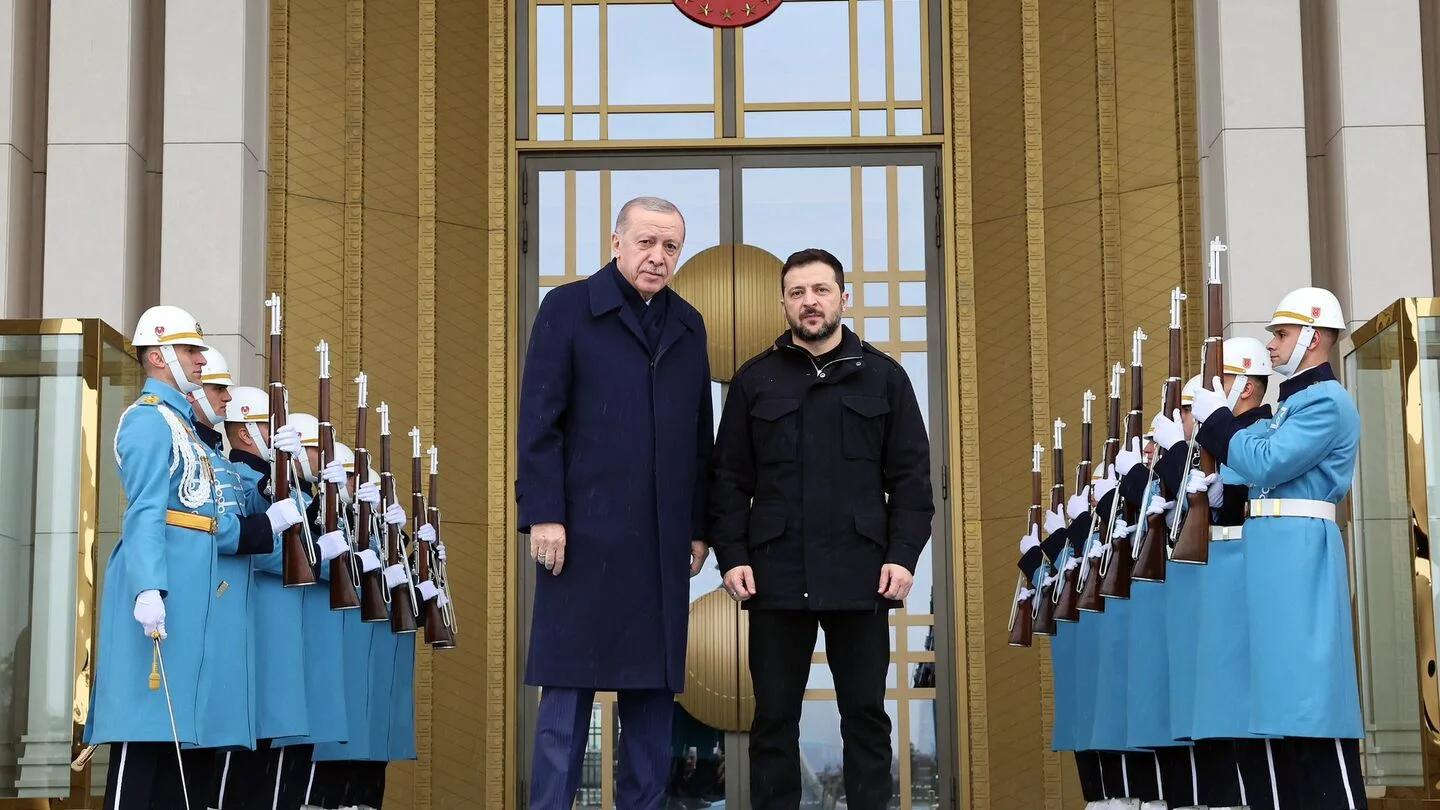Zelensky Arrives in Ankara for High-Stakes Talks
February 19, 2025 Ukrainian President Volodymyr Zelensky arrived in Ankara on Monday evening from the United Arab Emirates (UAE), where he began talks with Turkish President Recep Tayyip Erdogan to discuss a range of issues, including prisoner exchanges between Ukraine and Russia, and regional security concerns. The discussions at Erdogan’s presidential palace, which began on Tuesday morning at 11:15 GMT, come amid a notable shift in U.S.-Russia diplomacy regarding the ongoing war in Ukraine and efforts to bring the conflict to an end.
Turkey’s Role in Ukraine-Russia Mediation
This meeting, Zelensky’s third visit to Turkey since Russia’s invasion of Ukraine, is seen as part of broader diplomatic efforts to secure Ukraine’s position in ongoing peace negotiations. Turkey, a NATO member, has played a key role in mediating prisoner swaps between Russia and Ukraine, helping to bring hundreds of prisoners home despite the continuing conflict, and remains a crucial player in ongoing diplomatic engagements involving the West, Russia, and Ukraine.
Concerns Over Ukraine’s Exclusion from United-Russia Talks
Zelensky, who had been expected in Riyadh on Wednesday, postponed his visit to Saudi Arabia to March 10, citing concerns over the exclusion of Ukraine from U.S.-Russia talks. Earlier in the day, U.S. Secretary of State Marco Rubio and Russian Foreign Minister Sergey Lavrov met in Riyadh for the first high-level talks between the two powers since Russia’s invasion nearly three years ago.
The meeting in Riyadh focused on discussions aimed at reopening diplomatic ties and exploring paths toward ending the war in Ukraine. However, Ukrainian officials were notably absent, raising concerns in Kyiv and among European allies about a potential resolution that could bypass Ukraine’s interests. Zelensky criticized the U.S.-Russia talks, emphasizing that any efforts to broker peace must involve Ukraine and be “fair.”
Also See: Belarus Election: Putin Ally Lukashenko Declared Winner in Vote Despite Western Opposition
Zelensky’s Call for Inclusive Peace Talks
“Ukraine, Europe, and Turkey should be part of the conversations regarding the security guarantees for our part of the world,” Zelensky stated after his meeting with Erdogan. “Any decision made without Ukraine is unacceptable.”
In response, Erdogan reiterated Turkey’s role as a potential mediator in peace talks, highlighting the success of previous discussions in Istanbul in 2022, where the parties came closest to reaching an agreement. “Turkey will be an ideal host for any potential talks between Russia, Ukraine, and America,” Erdogan said. “We’ve shown our commitment to dialogue, and we are ready to play that role again.”
Turkey’s Balanced Approach to the War
Turkey’s approach has been balanced; while it has provided drones to Ukraine, it has avoided joining Western sanctions on Russia, maintaining strong ties with both warring Black Sea neighbors. Erdogan has positioned himself as a key go-between, striving to bridge the gap between Moscow and Kyiv and advocating for a peaceful resolution to the conflict, underscoring Turkey’s ongoing diplomatic role in the region.
Uncertainty Over Ukraine’s Role in Future Negotiations
As the diplomatic landscape continues to evolve, Ukraine’s exclusion from talks in Riyadh signals the complex and often contentious nature of international negotiations on the war in Ukraine. U.S. and Russian officials are discussing the possibility of a summit between their leaders, but European leaders and Kyiv are wary of being sidelined in any final settlement.
Zelensky’s Message: Ukraine Must Be Included peace negotiation
Zelensky’s visit to Turkey underscores the importance of including Ukraine in the conversation about its future. As international leaders weigh their next steps, all eyes are on the diplomatic developments in Ankara, Riyadh, and beyond.
For now, Zelensky’s message is clear: Ukraine must have a seat at the table in any discussions aimed at ending the war that has left thousands dead and displaced.
This news is sourced from France 24 and is intended for informational purposes only.






